Dec 9, 2019 - Three history majors completing discipline-specific honors programs in history delivered condensed versions of their honors theses and answered questions from their faculty thesis committees during separate defenses in December 2019. Luke Sower, Katie Allison, and Leah Atkins all successfully defended their theses.
Sower’s defense of his thesis titled “The Lords of All Creation: Environmental Transformation in the Rise of Tenochtitlan” took place on December 3. His faculty committee was comprised of Dr. David Thomas, who was his thesis director, Dr. Keith Bates, and Dr. Karen Martin of Union’s Department of Language. In his thesis, Sower argued that the Aztec capital city of Tenochtitlan provides a fascinating study of the intimate link between human civilization and its natural environment. The city’s builders (a tribe called the Mexica) constructed their urban metropolis on a small island in the center of Lake Texcoco, and they used dikes, canals, and aqueducts to transform the lacustrine environment to their own benefit. This control of the lake water allowed them to construct large areas of chinampas gardens, one of the most productive agricultural techniques of the pre-industrial world. These works of environmental engineering were not small-scale, locally oriented practices, but massive, state-run, landscape-transforming public works. These Mexica efforts exhibited their ambition and opportunism and played a significant role in their construction of Tenochtitlan into a city that, at its height in the early 16th Century, was one of the largest cities in the world. photos
On the morning of December 9, Allison defended her thesis on “Biblical Feminism: An Oxymoron?”. Her thesis committee members were Dr. David Thomas, who supervised her thesis work, Dr. Keith Bates, and Dr. Janna Chance of the Department of English. Allison’s thesis was an intellectual history of second wave (1970s and 1980s) evangelical feminism and the ways in which evangelical feminists bridged the divide between conservative evangelicals and secular feminists during a period of increasing polarization. Conservative evangelicals and fundamentalists dismissed feminism as an individualistic grab for power that denied Biblical authority, and feminists often dismissed Christianity as hopelessly patriarchal. Conservative evangelicals and secular feminists agreed on one thing: that Scripture prescribed a hierarchical view of gender, an understanding that Biblical feminists argued against. Second wave Biblical feminists sought to demonstrate that God’s design for relationships between the sexes in the home and the church was not patriarchal or hierarchical but rooted in unity and mutuality. They argued that an egalitarian approach was a move toward Biblical justice portrayed in the creation accounts, and that this approach was supported by the entire thrust of Scripture. In so doing, they rejected the polarized camps that claimed the positions were mutually exclusive. photos
On the afternoon of that same day, Atkins presented her thesis about “Poisonous Women: Gender and Power in Ancient Rome.” The three faculty members on her committee were Dr. Henry Allen, who directed her thesis, Dr. David Thomas, and Dr. Scott Huelin, the Director of the Honors Community. Using the works of the Roman writers Tacitus, Livy, and Juvenal, Atkins studied the question of aristocratic women poisoning their spouses as an aspect of gender and power in the early Roman Empire. She described the poisonings as symbolic of what she called feminine ambiguity in Roman culture. Poisonous women represented in their persons two opposing ideas: while they acquired masculine powers in areas such as politics and finances, they occupied a lesser status in Roman society than men. Atkins maintains that the writers’ depictions of poisonous women are reflections of the resentment and anxiety of aristocratic men over the new levels of power that upper-class women achieved as a result of the political and social transformation that Emperor Augustus brought to the Roman world, and that his Julio-Claudian dynasty continued thereafter. photos
In addition to the honors students and their faculty committees, other members of the history department as well as students attended one or more of the presentations. Honors Director Huelin was present at all three defenses and Sower’s mother attended his.
Sower Defense
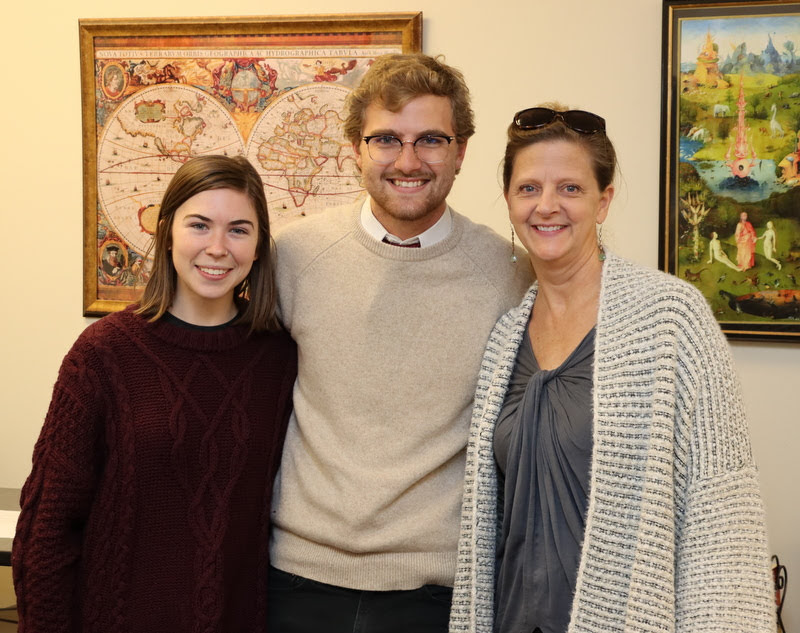 Luke Sower stands with his wife Brittany (left) and his mother Rebecca prior to his history honors thesis defense on December 3, 2019.
Luke Sower stands with his wife Brittany (left) and his mother Rebecca prior to his history honors thesis defense on December 3, 2019.
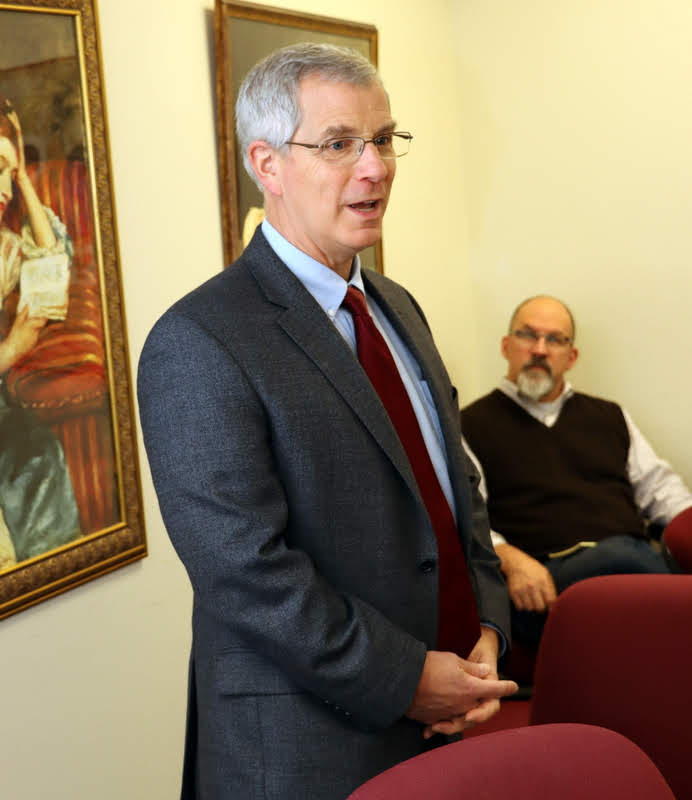 Dr. David Thomas introduces Luke Sower at Sower's honors thesis defense on December 3, 2019.
Dr. David Thomas introduces Luke Sower at Sower's honors thesis defense on December 3, 2019.
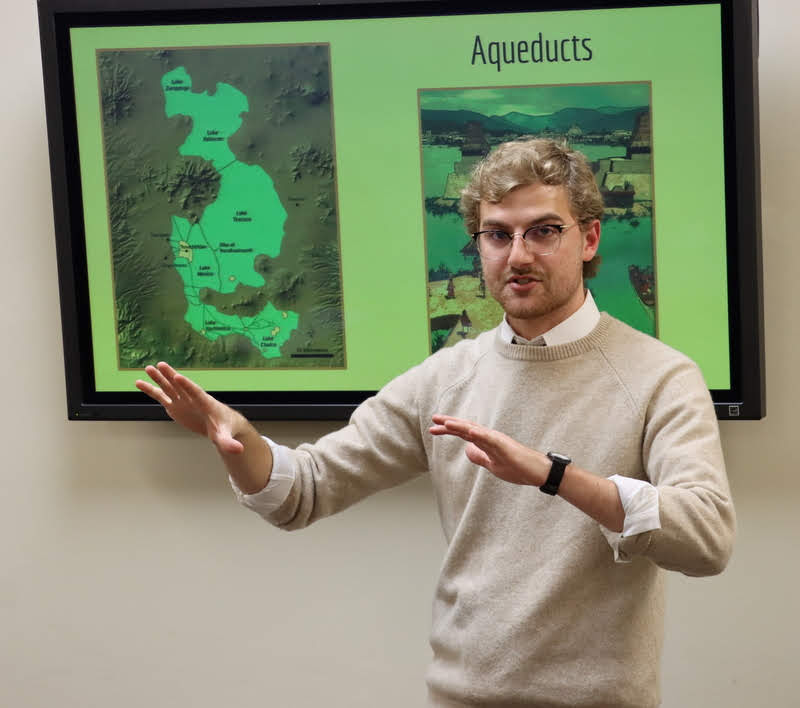 Luke Sower presents an abridged version of his history honors thesis titled "The Lords of All Creation: Environmental Transformation in the Rise of Tenochtitlan" on December 3, 2019.
Luke Sower presents an abridged version of his history honors thesis titled "The Lords of All Creation: Environmental Transformation in the Rise of Tenochtitlan" on December 3, 2019.
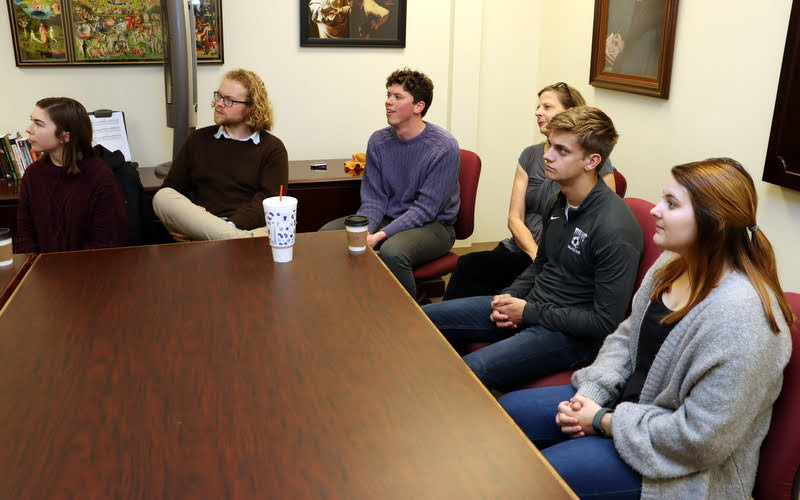 Attendees listen to Luke Sower present his honors thesis on Tenochtitlan on December 3, 2019. They are (left to right) Brittany Sower, Clark Hubbard, Christopher Roberts, Rebecca Sower, Jonathan Clemmons, and Kari Ormsby.
Attendees listen to Luke Sower present his honors thesis on Tenochtitlan on December 3, 2019. They are (left to right) Brittany Sower, Clark Hubbard, Christopher Roberts, Rebecca Sower, Jonathan Clemmons, and Kari Ormsby.
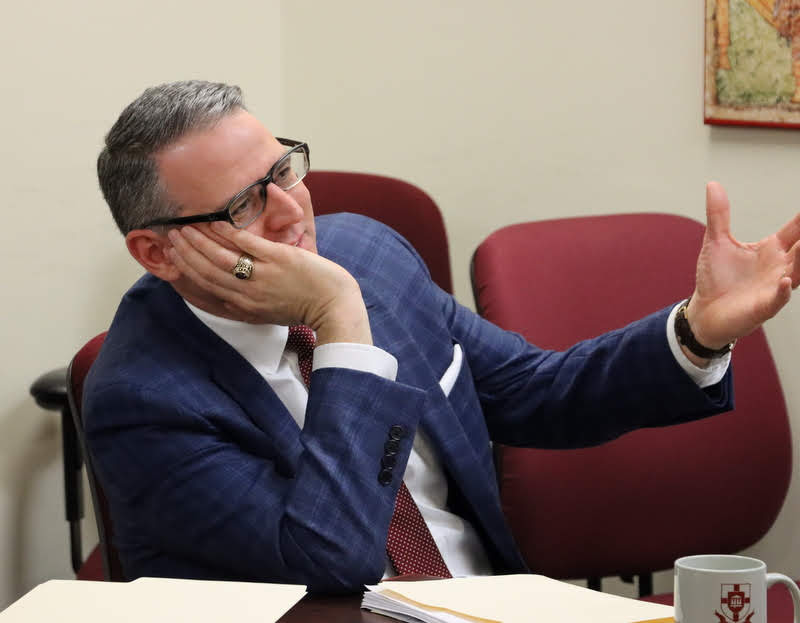 Thesis committee member Dr. Keith Bates asks a question during Luke Sower's thesis defense on December 3, 2019.
Thesis committee member Dr. Keith Bates asks a question during Luke Sower's thesis defense on December 3, 2019.
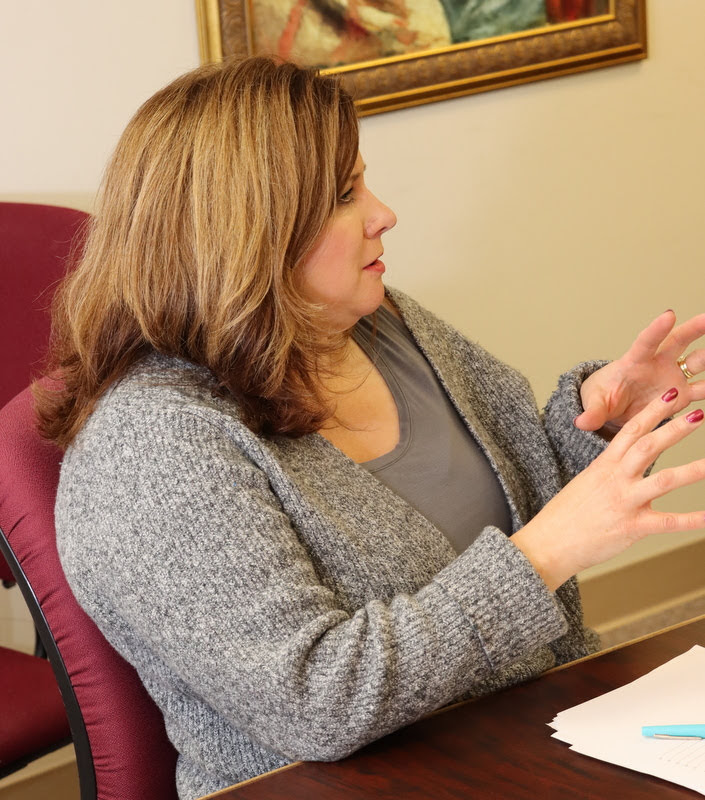 Thesis committee member Dr. Karen Martin asks a question of Luke Sower during a question and answer time at Sower's honors thesis defense on December 3, 2019.
Thesis committee member Dr. Karen Martin asks a question of Luke Sower during a question and answer time at Sower's honors thesis defense on December 3, 2019.
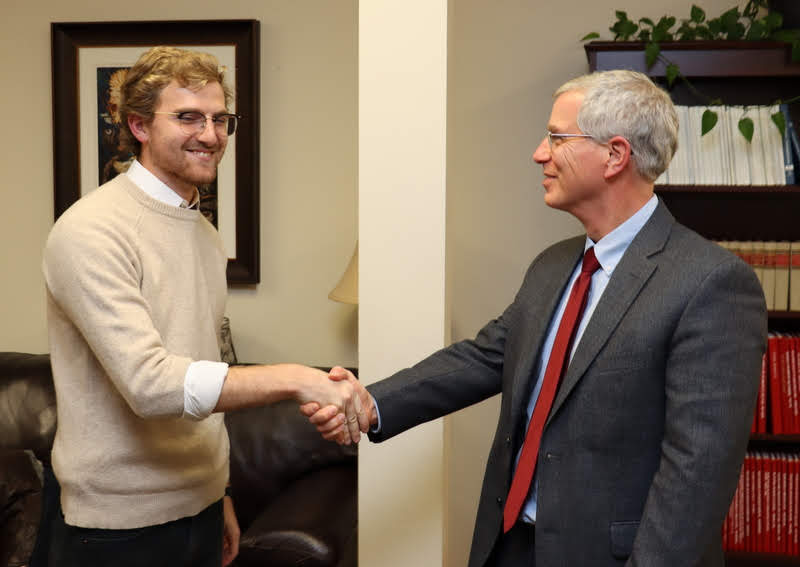 Dr. David Thomas, the chair of Luke Sower's honors thesis committee, congratulates Sower on his successful thesis defense on December 3, 2019.
Dr. David Thomas, the chair of Luke Sower's honors thesis committee, congratulates Sower on his successful thesis defense on December 3, 2019.
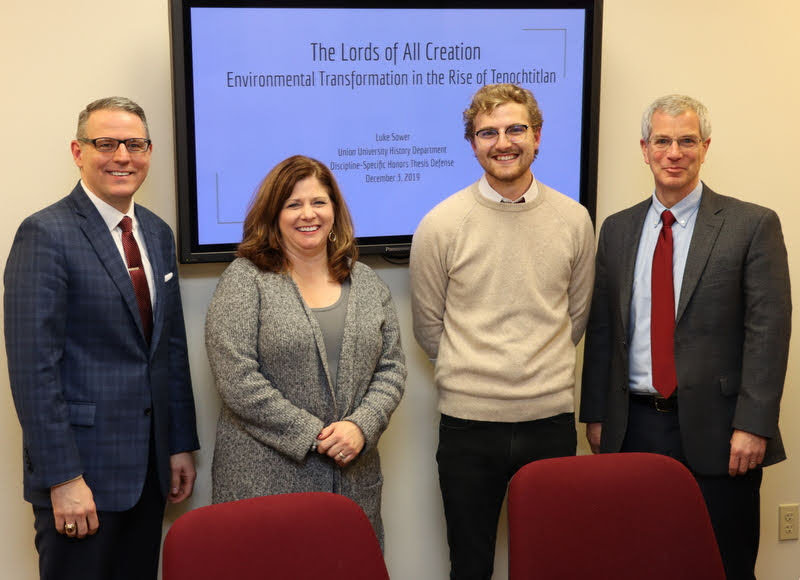 Luke Sower (second from right) stands with members of his honors thesis committee following his successful thesis defense on December 3, 2019. They are (left to right) Dr. Keith Bates, Dr. Karen Martin, and thesis director Dr. David Thomas.
Luke Sower (second from right) stands with members of his honors thesis committee following his successful thesis defense on December 3, 2019. They are (left to right) Dr. Keith Bates, Dr. Karen Martin, and thesis director Dr. David Thomas.
Allison Defense
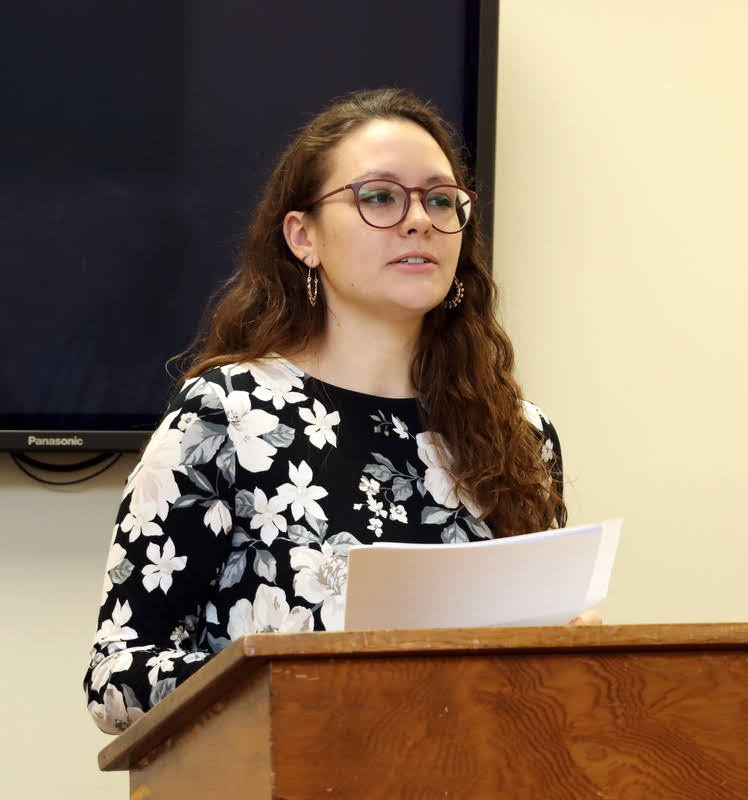 History major Katie Allison presents an abridged version of her history honors thesis on "Biblical Feminism: An Oxymoron?" at her thesis defense on December 9, 2019.
History major Katie Allison presents an abridged version of her history honors thesis on "Biblical Feminism: An Oxymoron?" at her thesis defense on December 9, 2019.
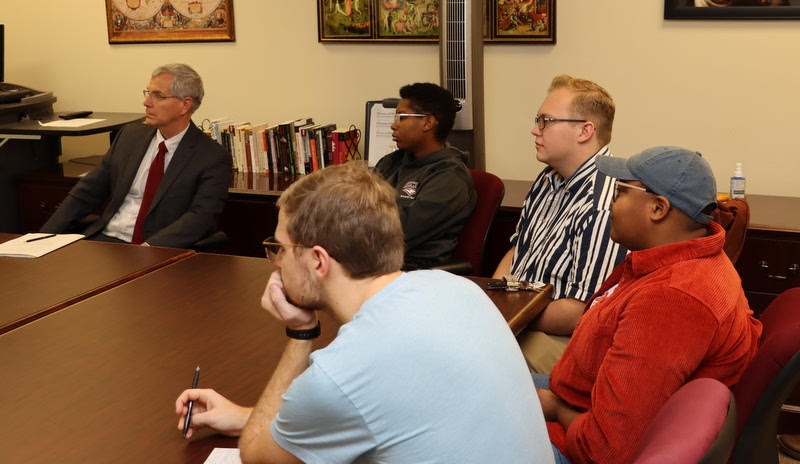 Attendees listen to Katie Allison deliver an abridged version of her honors thesis about "Biblical Feminism: An Oxymoron?" on December 9, 2019. They are (starting on the left and going clockwise) Dr. David Thomas, Daisha Jiles, Nathan Heatherly, Ashley Akerson, and Luke Sower.
Attendees listen to Katie Allison deliver an abridged version of her honors thesis about "Biblical Feminism: An Oxymoron?" on December 9, 2019. They are (starting on the left and going clockwise) Dr. David Thomas, Daisha Jiles, Nathan Heatherly, Ashley Akerson, and Luke Sower.
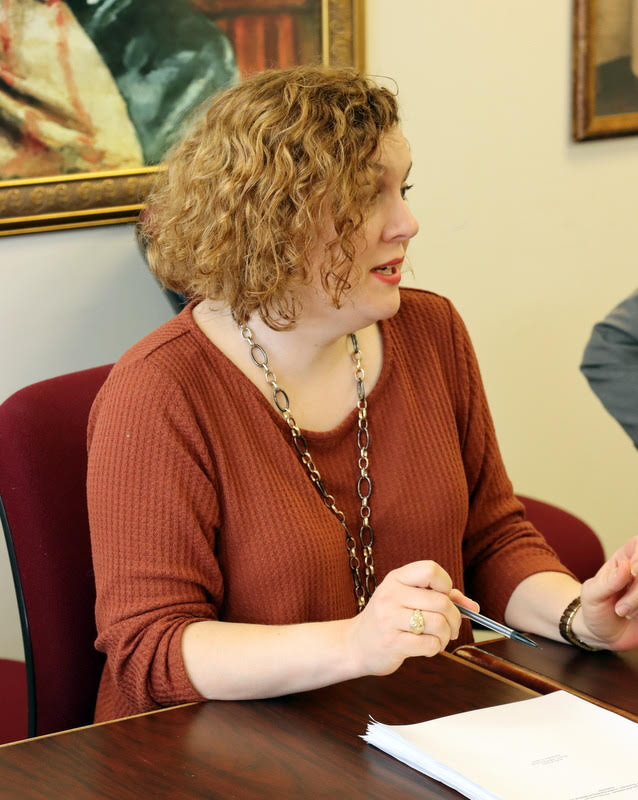 Honors thesis committee member Dr. Janna Chance comments on Katie Allison's honors thesis at Allison's thesis defense on December 9, 2019.
Honors thesis committee member Dr. Janna Chance comments on Katie Allison's honors thesis at Allison's thesis defense on December 9, 2019.
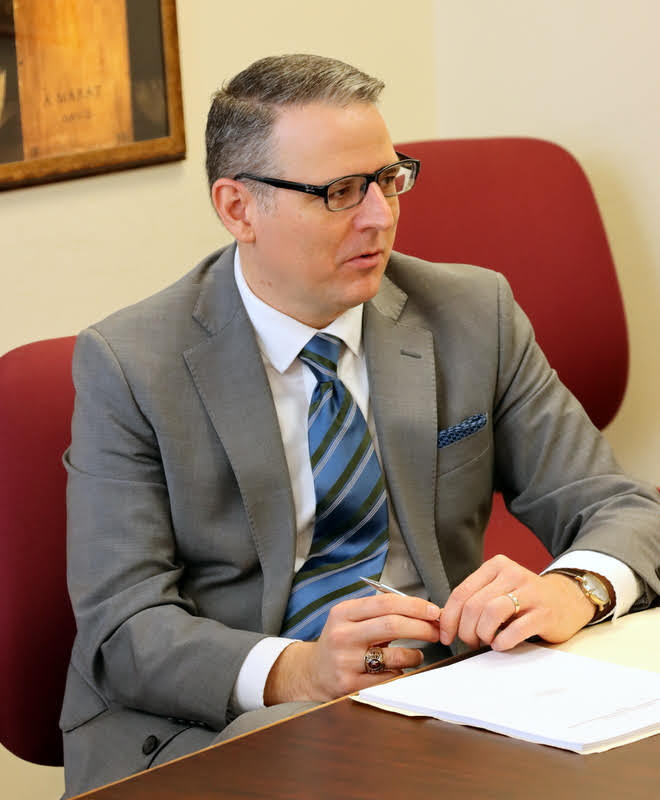 Honors thesis committee member Dr. Keith Bates asks Katie Allison a question during her thesis defense on December 9, 2019.
Honors thesis committee member Dr. Keith Bates asks Katie Allison a question during her thesis defense on December 9, 2019.
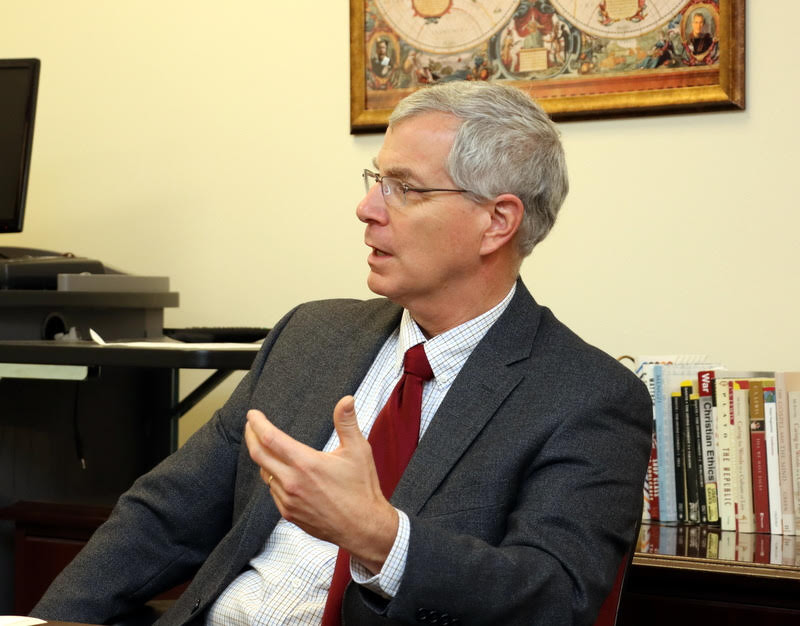 Dr. David Thomas, Katie Allison's thesis director, comments on her honors thesis during her defense on December 9. 2019.
Dr. David Thomas, Katie Allison's thesis director, comments on her honors thesis during her defense on December 9. 2019.
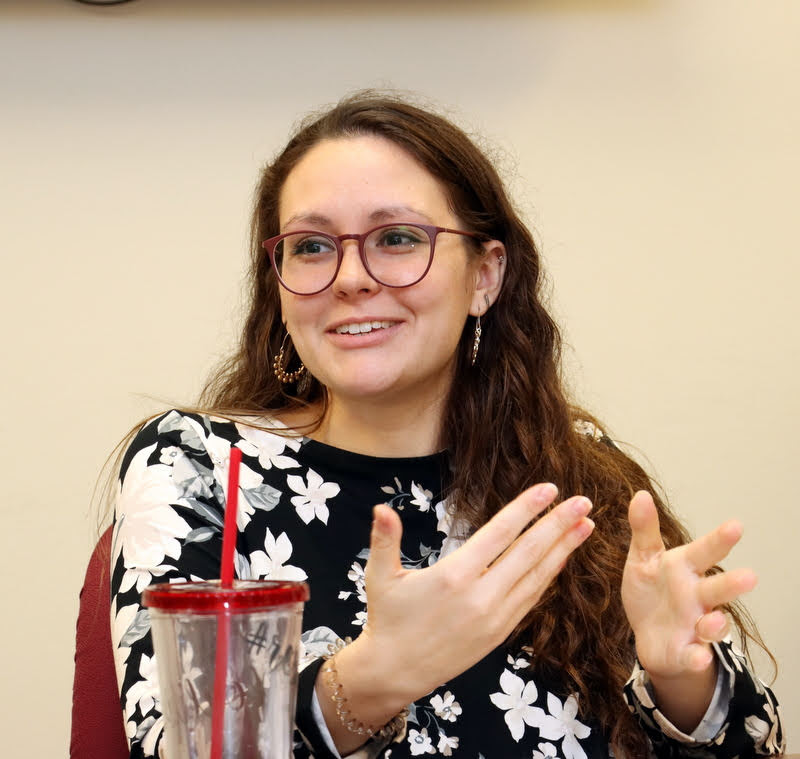 Katie Allison answers a question during her history honors thesis defense on December 9, 2019.
Katie Allison answers a question during her history honors thesis defense on December 9, 2019.
 Dr. David Thomas, chair of Katie Allison's honors thesis committee, congratulates her on her successful thesis defense on December 9, 2019.
Dr. David Thomas, chair of Katie Allison's honors thesis committee, congratulates her on her successful thesis defense on December 9, 2019.
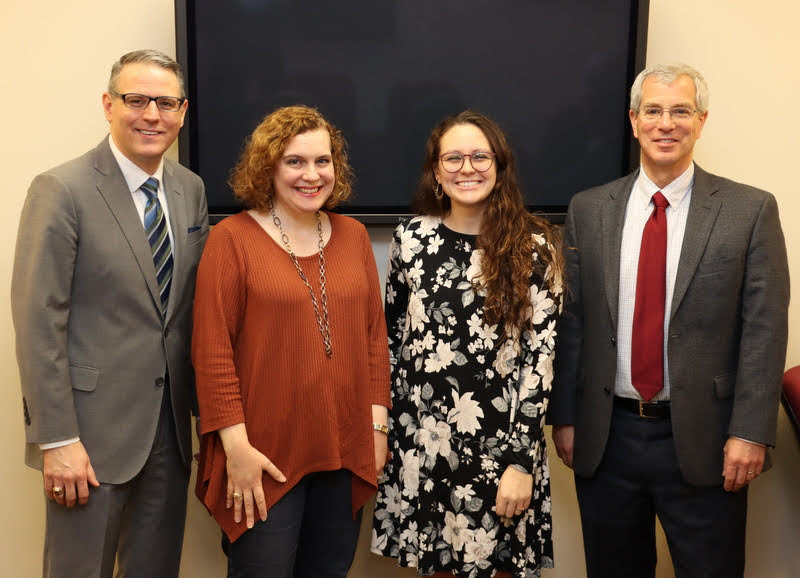 Katie Allison (second from right) stands with members of her history honors thesis committee following her successful defense on December 9, 2019. Committee members are (left to right) Dr. Keith Bates, Dr. Janna Chance, and thesis committee chair Dr. David Thomas
Katie Allison (second from right) stands with members of her history honors thesis committee following her successful defense on December 9, 2019. Committee members are (left to right) Dr. Keith Bates, Dr. Janna Chance, and thesis committee chair Dr. David Thomas
Atkins Defense
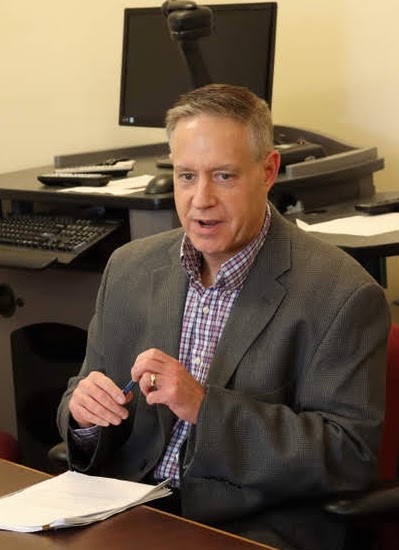 Dr. Henry Allen, Leah Atkins' honors thesis director, welcomes attendees at her thesis defense on December 9, 2019.
Dr. Henry Allen, Leah Atkins' honors thesis director, welcomes attendees at her thesis defense on December 9, 2019.
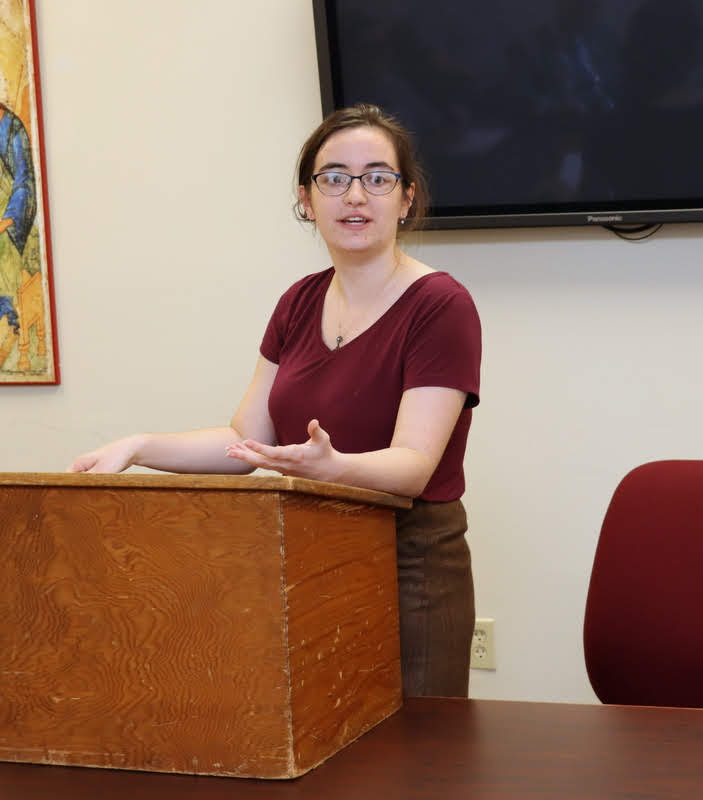 Leah Atkins presents an abridged version of her history honors thesis titled "Poisonous Women: Gender and Power in Ancient Rome" at her thesis defense on December 9, 2019.
Leah Atkins presents an abridged version of her history honors thesis titled "Poisonous Women: Gender and Power in Ancient Rome" at her thesis defense on December 9, 2019.
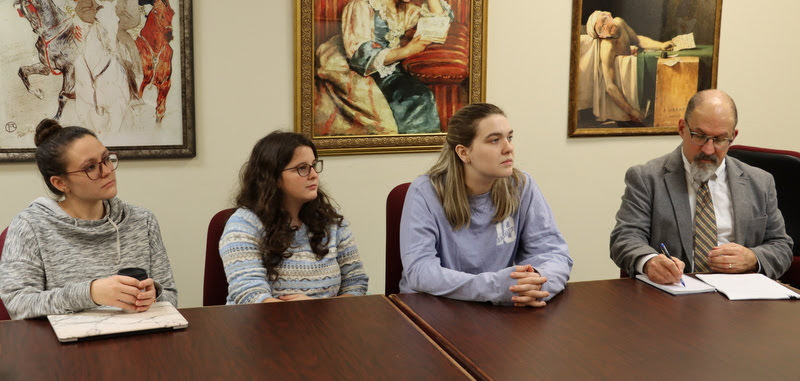 Attendees listen to Leah Atkins present her honors thesis on "Poisonous Women: Gender and Power in Ancient Rome" on December 9, 2019. They are (left to right) Katie Allison, Madison Morris, Ashley Perkins, and Dr. Scott Huelin.
Attendees listen to Leah Atkins present her honors thesis on "Poisonous Women: Gender and Power in Ancient Rome" on December 9, 2019. They are (left to right) Katie Allison, Madison Morris, Ashley Perkins, and Dr. Scott Huelin.
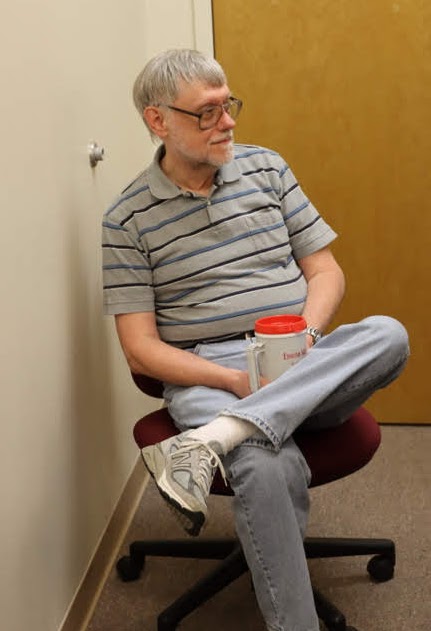 Dr. Terry Lindley listens to Leah Atkins talk about her honors thesis at her thesis defense on December 9, 2019.
Dr. Terry Lindley listens to Leah Atkins talk about her honors thesis at her thesis defense on December 9, 2019.
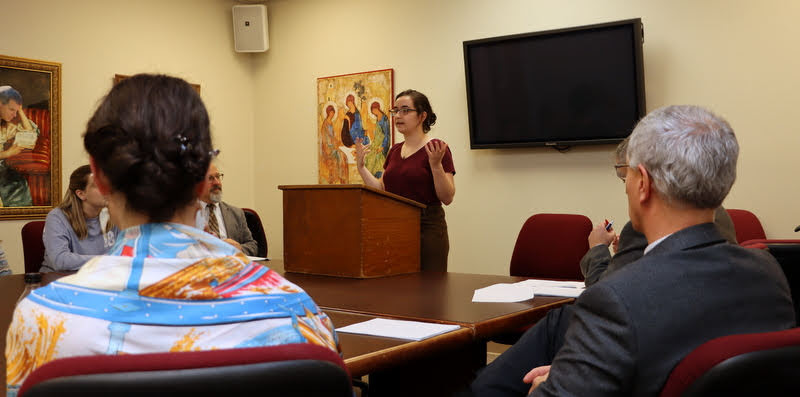 Attendees listen to Leah Atkins discuss her honors thesis on "Poisonous Women" in ancient Rome during her thesis defense on December 9, 2019.
Attendees listen to Leah Atkins discuss her honors thesis on "Poisonous Women" in ancient Rome during her thesis defense on December 9, 2019.
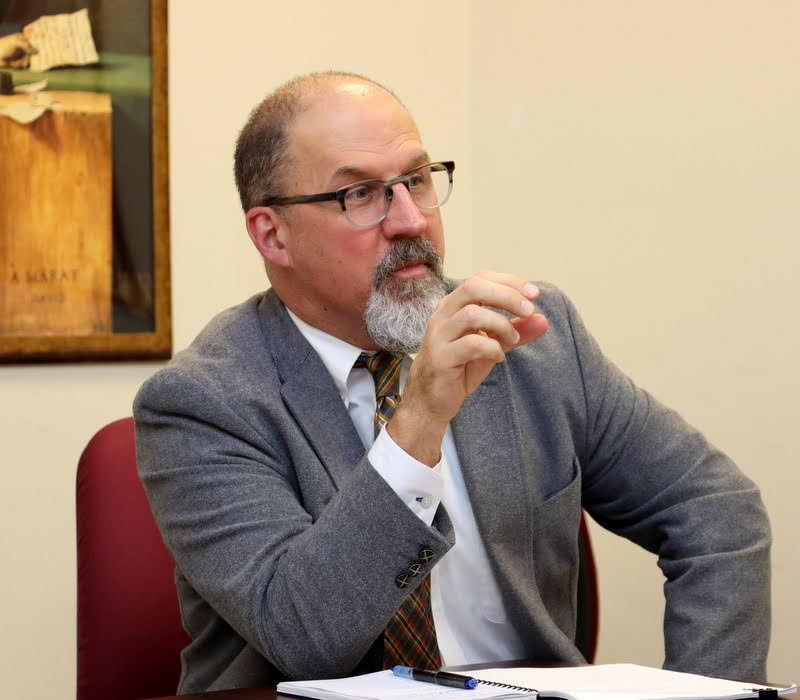 Honors thesis committee member Dr. Scott Huelin asks a question of Leah Atkins at her thesis defense on December 9, 2019.
Honors thesis committee member Dr. Scott Huelin asks a question of Leah Atkins at her thesis defense on December 9, 2019.
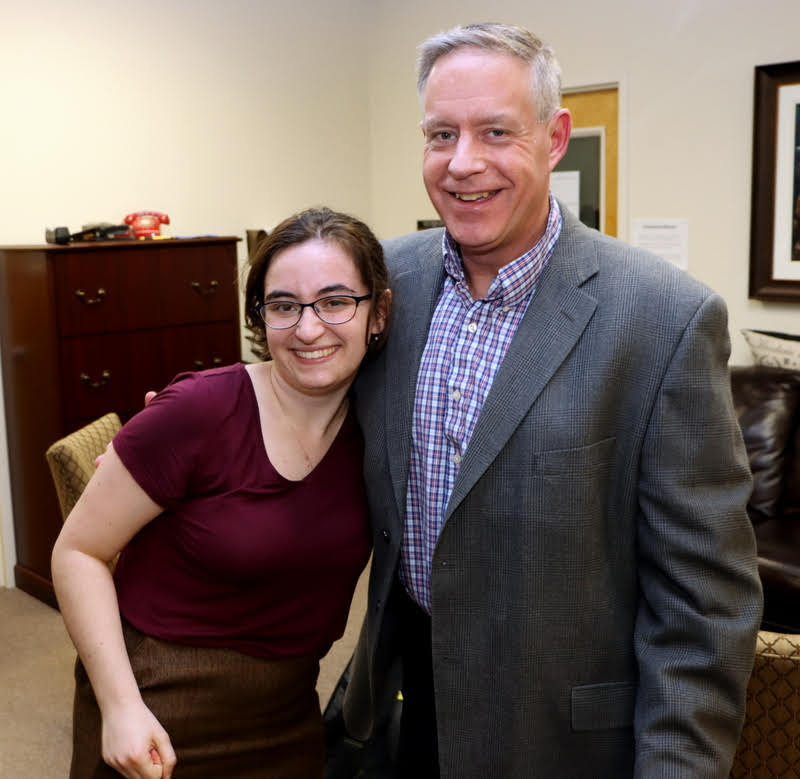 Dr. Henry Allen congratulates Leah Atkins on her successful honors thesis defense on December 9, 2019.
Dr. Henry Allen congratulates Leah Atkins on her successful honors thesis defense on December 9, 2019.
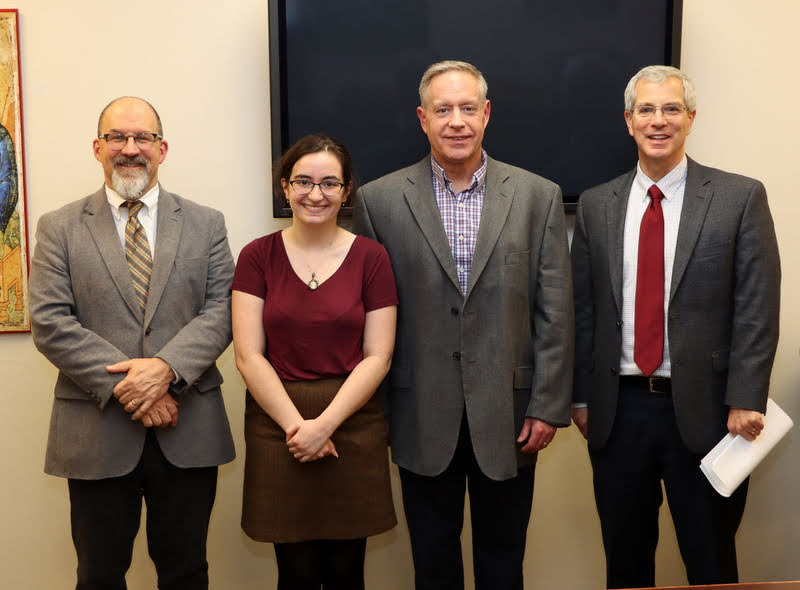 Leah Atkins stands with her history honors thesis committee after her successful thesis defense on December 9, 2019. The committee members are (left to right) Dr. Scott Huelin, Dr. Henry Allen, the thesis committee chair, and Dr. David Thomas.
Leah Atkins stands with her history honors thesis committee after her successful thesis defense on December 9, 2019. The committee members are (left to right) Dr. Scott Huelin, Dr. Henry Allen, the thesis committee chair, and Dr. David Thomas.
